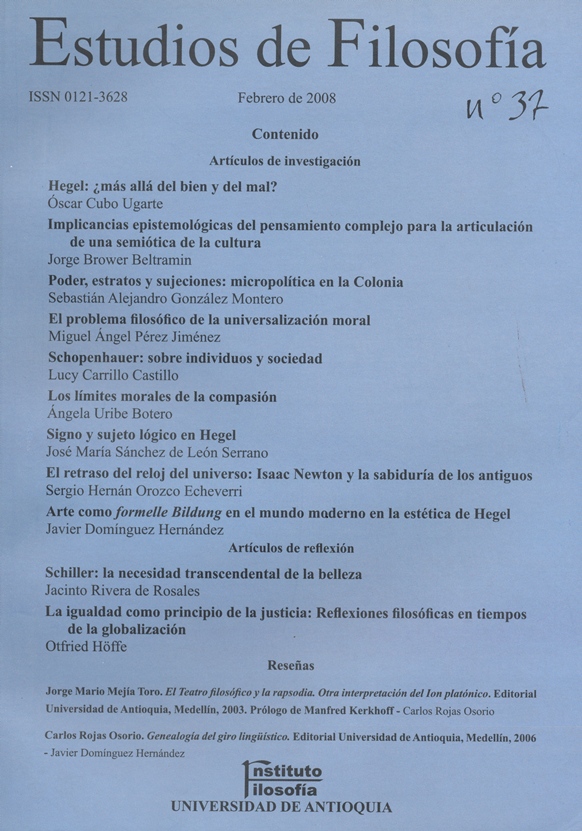Sign and logical subject in Hegel
DOI:
https://doi.org/10.17533/udea.ef.12727Keywords:
Auto-referentiality, Ground, Intuition, Indiscernibility, Presupposition, Result, Sign, UniversalityAbstract
The paper examines the essential connection between the Hegelian concept of sign and the functioning of speculative discourse in the Science of Logic. Starting from the unresolved tension in Kantian philosophy between the significant capacity of discourse and its auto-referentiality, there will be a focus on the Hegelian intent to resolve this tension in his treatment of language, which is to be found in the Encyclopedia of Philosophical Sciences. We will thus uncover the subtle way in which the Hegelian conception of sign enables the overcoming of the restrictions that Kant imposes on philosophical discourse without defying the basic prescription of Critical Philosophy, according to which all thinking has to be associated with an intuition in order to constitute a knowledge which pretends to be valid. Based on that result and concentrating on the very structure of the sign as Hegel conceptualizes it, we will then try to shed some light on the exact functioning of logical discourse and its basic moments – understanding, dialectics and speculation – by means of the specific example of the first three determinations of Logic: Being, Nothing and Becoming.
Downloads
References
ALBIZU, E. Comienzo como comienzo especulativo. En: Escritos de Filosofía. Buenos Aires, vol. 25-26, 1994.
FULDA, H. F. “Das endliche Subjekt der eigentlichen Metaphysik”. En: Stolzenberg, J. (ed.). Subjekt und Metaphysik. Konrad Cramer zu Ehren aus Anlaß seines 65. Geburtstags. Vandenhoeck & Ruprecht, Göttingen, 2001.
HEGEL, G. W. F. Gesammelte Werke (ed. Nordrhein-Westfälischen Akademie der Wissenschaften).
HEGEL, G. W. F. Phänomenologie des Geistes. En: Gesammelte Werke, Bd. 9. Feliz Meiner, Hamburg, 1980. DOI: https://doi.org/10.28937/978-3-7873-3389-9
HEGEL, G. W. F. Wissenschaft der Logik. Erster Band. Die objektive Logik (1812/13). Zweites Buch. Die Lehre vom Wesen. En: Gesammelte Werke, Bd. 11. Felix Meiner, Hamburg, 1978.
HEGEL, G. W. F. Wissenschaft der Logik. Zweiter Band. Die subjektive Logik (1816). En: Gesammelte Werke, Bd. 12. Felix Meiner, Hamburg, 1981. DOI: https://doi.org/10.28937/978-3-7873-3392-9
HEGEL, G. W. F. Enzyklopädie der philosophischen Wissenchaften in Grundrisse (Enz) (1832). En: Gesammelte Werke, Bd. 20. Felix Meiner, Hamburg, 1959.
HORN, J. C. Monade und Begriff. Der Weg von Leibniz zu Hegel. Felix Meiner, Hamburg, 1982. DOI: https://doi.org/10.28937/978-3-7873-2695-2
KANT, I. Kritik der reinen Vernunft (KrV). Felix Meiner, Hamburg, 1998. DOI: https://doi.org/10.28937/978-3-7873-2112-4
LEIBNIZ, G. W./Clarke, S. Correspondence. Ed. de Roger Ariew. Hackett, Indianapolis, 2000.
MARTÍNEZ, F. Hölderlin y la lógica hegeliana. Visor, Madrid, 1995.
PEIRCE, Ch. S. Collected Papers. 8 vols. Edited by Charles Hartshorne and Paul Weiss (vols. 1-6) and by A. W. Burks (vols. 7-8). Belknap, Cambridge, Mass., 1931-1958.
SAUSSURE, F. de. Cours de linguistique générale. Payot, Paris, 1916.
Downloads
Published
How to Cite
Issue
Section
Categories
License
Copyright (c) 2008 José María Sánchez de León Serrano

This work is licensed under a Creative Commons Attribution-NonCommercial-ShareAlike 4.0 International License.
Authors who publish with this journal agree to the following terms:
1. The Author retains copyright in the Work, where the term "Work" shall include all digital objects that may result in subsequent electronic publication or distribution.
2. Upon acceptance of the Work, the author shall grant to the Publisher the right of first publication of the Work.
3. The Author shall grant to the Publisher a nonexclusive perpetual right and license to publish, archive, and make accessible the Work in whole or in part in all forms of media now or hereafter known under a Creative Commons Attribution-NoCommercia-ShareAlike (CC BY-NC-SA 4.0), or its equivalent, which, for the avoidance of doubt, allows others to copy, distribute, and transmit the Work under the following conditions: (a) Attribution: Other users must attribute the Work in the manner specified by the author as indicated on the journal Web site;(b) Noncommercial: Other users (including Publisher) may not use this Work for commercial purposes;
4. The Author is able to enter into separate, additional contractual arrangements for the nonexclusive distribution of the journal's published version of the Work (e.g., post it to an institutional repository or publish it in a book), as long as there is provided in the document an acknowledgement of its initial publication in this journal;
5. Authors are permitted, and Estudios de Filosofía promotes, to post online the preprint manuscript of the Work in institutional repositories or on their Websites prior to and during the submission process, as it can lead to productive exchanges, as well as earlier and greater citation of published work (see The Effect of Open Access). Any such posting made before acceptance and publication of the Work is expected be updated upon publication to include a reference to the Estudios de Filosofía's assigned URL to the Article and its final published version in Estudios de Filosofía.















